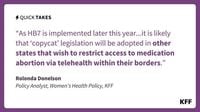On September 17, 2025, Texas Governor Greg Abbott signed into law House Bill 7 (HB7), a sweeping measure that dramatically escalates the state’s already stringent abortion restrictions. The new law, which takes effect December 4, 2025, empowers private citizens to sue any individual or company that manufactures, distributes, mails, transports, delivers, prescribes, or provides medication abortion pills to Texans. This bold legislative step not only tightens the legal noose around abortion providers and facilitators but also signals Texas’s intention to remain at the forefront of the national abortion debate.
HB7’s legal framework is striking in its novelty and reach. According to reporting from Townsquare Media and KFF, the law offers a minimum of $100,000 in damages to successful plaintiffs. If the plaintiff is a sibling, grandparent, or father of the fetus, they receive the full amount. For other plaintiffs, the direct award is $10,000, with the remaining 90% of the damages directed to a charity of their choosing. This bounty-like system, which incentivizes private citizens to police abortion access, builds on the controversial precedent set by Texas’s 2021 Senate Bill 8 (SB8). That earlier law allowed civil lawsuits against anyone aiding an abortion after approximately six weeks of gestation, effectively deputizing the public to enforce the ban.
Unlike previous abortion laws, HB7 zeroes in on the supply chain for abortion medication—targeting not only doctors and clinics but also pharmaceutical companies, telehealth providers, mail carriers, and anyone else involved in the delivery of abortion pills to or from Texas. The bill’s architects say this approach is designed to close any remaining loopholes that might allow abortion pills to reach women in the state, particularly as telehealth has become an increasingly common method for accessing reproductive care. As Townsquare Media notes, "The concept behind the bill is to close any loopholes that pharmaceutical companies and others may be exploiting in order to get the pills to women."
Importantly, the law does not allow lawsuits against women who take abortion pills, even if they self-manage their abortions or take the medication following a miscarriage. As KFF reports, "The bill expressly prohibits a pregnant person who self-manages their abortion from being sued." This carve-out is intended, at least in part, to shield women from direct legal jeopardy while still making it exceedingly difficult for them to obtain the pills in the first place.
Texas’s aggressive legislative tactics are nothing new. Even before the Supreme Court’s Dobbs decision in 2022 overturned Roe v. Wade, Texas was at the vanguard of states seeking to restrict abortion. SB8, enacted in 2021, was a watershed moment, enabling private citizens to sue anyone who aided an abortion after about six weeks—well before many women even know they are pregnant. Although relatively few lawsuits were filed under SB8, the law’s chilling effect was immediate and profound. Fear of financial ruin and legal entanglement deterred not just abortion providers, but also friends, family members, and even rideshare drivers from assisting those seeking abortions.
With HB7, Texas lawmakers have doubled down on this strategy, extending the threat of civil litigation to anyone involved in the provision of abortion pills. The timing is significant: medication abortion now accounts for more than half of all abortions nationwide, and recent data shows a sharp uptick in the use of telehealth to access these medications. According to KFF, "A quarter of abortions are now provided through telehealth." In December 2024 alone, nearly 4,000 abortions in Texas were performed via telehealth, despite the state’s existing bans and restrictions.
The rise of telehealth abortions has posed a formidable challenge to state-level abortion bans. Shield laws in some states have sought to protect doctors and providers who offer reproductive care to residents of states where abortion is banned. But Texas’s new law aims to pierce these protections by threatening out-of-state providers with crippling civil penalties if they serve Texas residents. In December 2024, Texas Attorney General Ken Paxton filed the first lawsuit of its kind against a New York doctor who provided medication abortion pills to Texas residents, marking a new front in the legal battle over interstate abortion access.
Proponents of HB7 argue that the law is necessary to uphold the state’s commitment to protecting unborn life and to prevent companies from circumventing Texas law through mail-order pills and telemedicine. They contend that without such measures, abortion bans are toothless in the face of modern technology and interstate commerce. Supporters also point to the bill’s exemption for women who self-manage their abortions as evidence of compassion and focus on suppliers rather than patients.
Critics, however, see HB7 as an alarming escalation in the war on reproductive rights. They argue that the law encourages vigilantism, undermines medical privacy, and could have a devastating impact on women’s health—especially for those experiencing miscarriages or complications. The financial incentives for plaintiffs, they warn, could lead to a wave of lawsuits and further stigmatize those seeking care. As Townsquare Media reports, "There's almost a bounty being placed out there for people to go after, and that could get scary."
The law’s chilling effect is expected to be significant. As KFF observes, "As HB7 is implemented later this year, access to medication abortion through telehealth for Texas residents will likely shrink as the intended chilling effect of this legislation is felt across the state." Providers, wary of lawsuits, may stop serving Texas residents altogether, leaving many with few, if any, options for safe and legal abortion care. The ripple effects could extend beyond Texas, as other states consider adopting similar "copycat" legislation to restrict telehealth abortion access within their borders.
Despite these sweeping restrictions, the overall number of abortions nationwide has actually increased slightly since Roe v. Wade was overturned. This counterintuitive trend is attributed in part to expanded access to medication abortion pills through telehealth and other channels. But in Texas, the future of such access looks increasingly uncertain.
With HB7 set to take effect in December 2025, Texas has once again positioned itself as a flashpoint in the national debate over abortion rights. The law’s far-reaching provisions, hefty financial penalties, and focus on blocking medication abortion could reshape the legal landscape—not just in Texas, but across the country. As lawmakers, providers, and advocates brace for the next chapter, the eyes of the nation remain fixed on the Lone Star State.




